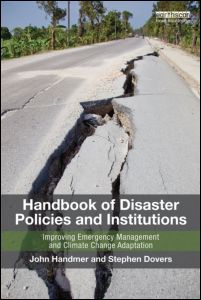Handbook of Disaster Policies and Institutions
Improving Emergency Management and Climate Change Adaptation, 2nd Edition
 By John Handmer, Stephen Dovers
By John Handmer, Stephen Dovers
Published 9th January 2013 by Routledge – 216 pages
Description:
‘An essential companion for anyone seeking to understand the policy context of disaster management. This new edition is especially welcome because it engages fully with the emerging thinking on the intersection of disaster management and climate change adaptation. Policy-making for disaster management also addresses the climate change adaptation challenge, making this book an important resource for those working in both adaptation and disaster management.’
– Jean Palutikof, Professor and Director, National Climate Change Adaptation Research Facility (NCCARF), Griffith University, Australia
'Handmer and Dovers successfully address the hot issues, taking into account local beliefs and indigenous knowledge and covering the areas of weakness we face in the least developed countries. This book is good guidance… I am very glad to have a copy of the 2nd Edition' – Ismail Fadl El Moula Mohamed, Director, Disaster Management, Sudan Meteorological Authority, Sudan
Praise for the first edition
'Too much emergency response to disasters has the hallmarks of panic or the deployment of immediate tactics without a strategic vision. This book is a significant contribution to seeking to correct this tendency. It does this admirably, by emphasizing both the practical and the tactical within a strong strategic framework that should help to make emergency response both better and more sustainable.' – Edmund Penning-Rowsell, Head, Flood Hazard Research Centre, Middlesex University, UK
Disasters both natural and human-induced are leading to spiralling costs in terms of human lives, lost livelihoods and damaged assets and businesses. Yet these consequences and the financial and human crises that follow catastrophes can often be traced to policies unsuited to the emerging scales of the problems they confront, and the lack of institutional capacity to implement planning and prevention or to manage disasters. This book seeks to overcome this mismatch and to guide development of a more strategic policy and institutional framework.
This updated and revised second edition includes new coverage of climate change adaptation, which has rapidly become central to disaster and emergency planning and management. This is an essential handbook for practitioners across the world seeking to improve the quality, robustness and capacity of their disaster management mechanisms.
Contents:
Introduction
Part 1: Constructing the Problem
1. The Nature of Emergencies and Disasters
2. The Nature of Policy and Institutions
Part 2: Constructing the Response
3. A Policy and Institutional Framework for Emergencies and Disasters
4. Owning the Problem: Politics, Participation and Communication
5. Framing the Problem: Identifying and Analysing Risk
6. Responding to the Problem: Policy Formulation and Implementation
7. Not Forgetting: Monitoring, Evaluation and Learning
8. Institutional Settings for Emergencies and Disasters: Form, Function and Coordination
Part 3: Constructing the Future
9. Future Prospects
For more information: http://www.routledge.com/books/details/9781849713511/








0 Comment :
Post a Comment
Thanks for your comment!